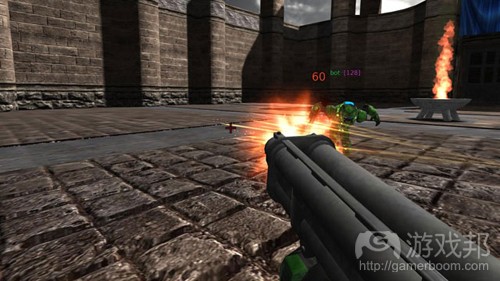为何网页将会成为全球性的游戏平台?
作者:Ron Piovesan
HTML5是否能够应对游戏?
答案当然是“可以”!不管是在台式机上还是在手机上,现在的HTML5已经能够支持大多数富有挑战性的游戏体验了。
我们都知道,玩家是一个非常苛刻的群体。这也是可被理解的。因为谁都不希望在自己沉浸于游戏玩法中而突然遇到一些磕磕碰碰的情况。
而关于这一点的最新证据是来自开发商Epic的Unreal Engine 3游戏已经被移植到网页上了。这便意味着源代码游戏以及运行于浏览器上的网页游戏间的区别将完全消失。并且我们也可以通过浏览器呈现出硬核玩家所习惯的3D图像和沉浸式体验。
浏览器也变得越来越完善了。全新的OdinMonkey JavaScripy引擎将运行于即将问世的Firefox版本上,并且性能也会提升1000%。现在你已经能让JavaScripy快速运行,并在浏览器上提供了让人兴奋的游戏体验。
是否想看看性能的提升会带来怎样的效果?那就着眼于基于网页版本的3D游戏的未来发展,如只基于网页技术而运行的第一人称3D射击游戏《BannanaBread》。现在,通过WebRTC(游戏邦注:是一个支持网络浏览器进行实时语音对话或视频对话的软件架构),你便能够从网页上感受到具有沉浸感的多人游戏行动了。
但是不要担心技术的问题——让我们说说游戏体验。艺电的Rich Hilleman曾经指出,游戏是关于魔法并超越想象力的极限。而网页所具有的一大潜力便是能让单一,持续的游戏体验始终伴随着你。
在多设备,多平台的世界中,消费者不会只是在一个环境下玩游戏。他们会在一天中的空闲时候利用手边的设备去玩游戏。而网页的普遍性便能做到这一点。
通过将游戏扩展到不同设备和不同形式的元素上,网页能够更好地将游戏呈现在刚接触游戏领域的休闲用户面前。
网页还能够带给游戏产业哪些帮助?
更广泛的影响力:要不怎么会有万维网之说!
市场营销和可发现性:开发者们不能局限于在一家应用商店中营销自己的游戏。广阔的网页及其内在的可连接性和共享性能够帮助开发者们更轻松地获得新用户。
支付:多年来,人们已经很习惯在网页上支付了。基于网页,开发者能够灵活地向用户收取费用,并使用任何可行的支付方式。
轻松地更新:游戏是在你的服务器上。开发者可以无需经过应用商店的审批过程而更新游戏。
简单的分析:再一次的,因为游戏是在你的服务器上,所以你无需等待来自应用商店的分析报告,你可以随时获得自己想要的分析信息。
用户关系:在网页上发行游戏意味着开发者与用户拥有直接的关系。游戏开发者无需经由应用商店或其它第三方去管理支付或更新。你将与用户拥有直接的关系,没人能够干预这种关系。
但是,就像Uken Games的Chris Ye所说的,游戏是关于传播幸福。如果开发者从网页中获得了所需要的性能,HTML5便能让他们无需为了各种设备而升级代码库便能在不同平台上传播幸福了。
为了发挥最大潜能并作为全球化的游戏平台,网页还有许多需要做的,但是它已经在朝着这一方向而发展了。在意识到网页所提供的利益时,整个游戏产业也在积极构建能够提高网页游戏性能的生态系统。这便是当前游戏市场的发展趋势。
(本文为游戏邦/gamerboom.com编译,拒绝任何不保留版权的转载,如需转载请联系:游戏邦)
Why the web will be a global gaming platform
By Ron Piovesan
One meme that will happily be put to rest is if HTML5 can handle gaming.
The answer is a resounding “Yes”! Whether on desktop or mobile, HTML5 is now at a stage where it can support the most challenging game experiences.
Gamers are a notoriously demanding bunch. And that’s understandable. You don’t want any hiccups or stutter in gameplay when you’ve got compounds to storm, races to win, balloons to pop, and ropes to cut.
The latest proof that stuff’s getting real now is that developer Epic’s Unreal Engine 3 game engine has been ported to the web. This means it will be almost impossible to tell the difference between a native code game and a web game running on the browser. The same 3D graphics and immersive experience hard core gamers are used to can now be handily served up via a browser.
Browsers are getting better, too. The new OdinMonkey JavaScript engine shipping on upcoming versions of Firefox and has a performance boost of about 1,000 percent (yes, that is three zeros) over anything else out there. Now you’ve got JavaScript running lighting fast and providing a mind-blowing gaming experience right in the browser.
Want to see what a boost in performance can provide? Check out the future of web-based 3D gaming on the totally awesome (but goofily named … it wasn’t my idea) BannanaBread demo, an incredible 3D first-person shooter running on nothing but web technologies. And if you’re not into playing games by yourself, you can now have immersive multi-player action served up over the web via WebRTC.
But never mind the technology — let’s talk game experience. As EA’s Rich Hilleman points out in the video below, games are about magic and pushing the limits of imagination. One potential the web offers is the possibility of a single, contiguous gaming experience that carries with you wherever you go.
In a multidevice, multiplatform world, the consumer won’t accept playing their game in only one environment. As they move about their day, they’ll want to access their game, at the right state, on the device they have handy. The ubiquity of the web provides for that.
Also, by extending games to different devices and different form factors, the web helps open up gaming to the casual user, who is a great new customer for the gaming industry.
How else can the web help the gaming industry?
Massive reach: It isn’t called the World Wide Web for nothing!
Marketing and discoverability: Developers aren’t restricted to marketing a game in the confines of an app store. The expanse of the web and all of its inherent linkability and shareability are available so developers can reach new customers.
Payments: People have been doing payments on the web for years. With the web, developers have the flexibility to charge what they want, and use the payment processer they want.
Easy updates: The game is on your server. Developers can update when they want without having to bother with store approval processes.
Easy analytics: Again, the game is on your server so you don’t have to wait for analytic reports from an app store, you get all the analytic information you need, in real time.
Customer relationship: Distributing a game on the web means the developer has a direct relationship with the customer. Game developers don’t need to go through an app store or any other third party to manage payments or updates. You have a direct line to the customer. No one is in the middle.
But ultimately, as Chris Ye of Uken Games says in the below video, gaming is about spreading happiness. If a developer is getting the performance they need from the web (and we think they will), then HTML5 lets them spread happiness across multiple platforms without the unhappiness of needing to maintain and upgrade multiple code bases for multiple devices.
The web still has some work to do to live up to its full potential as the ultimate global game platform, but it is getting there. And realizing the benefits the web provides, the industry participation in building out a game ecosystem is closely tracking the improvements in web game performance. That’s a trend we’ll see across the game market.(source:venturebeat)
上一篇:分享规范化游戏设计的四种模型









































